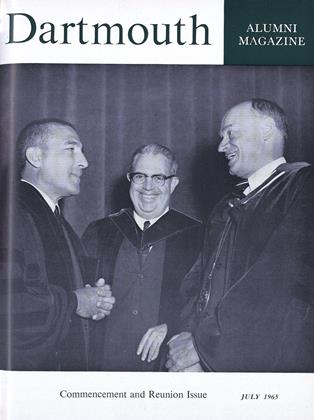A Rational Article
TO THE EDITOR:
I should like, publicly, to compliment Rodman Rockefeller '54 for his magnificent presentation of the real ethics of modern business (June 1965 issue).
I am not a businessman. I am a scientist. But the bridge between moral principles, business, science, art, lies in rationality. Mr. Rockefeller is rational. There is no such thing as magnanimity, nor altruism. We, all of us, are selfish. When we recognize that we can best attain our selfish aims by cooperating with our fellow men, we will have achieved wisdom.
West Chester, Pa.
Apathy and Non-Engagement?
TO THE EDITOR:
Recent publications from the college leave the impression that Hanover is a by water of glassy calm amidst the growing turbulence on American campuses.
The occupant of the Undergraduate Chair recently wrote of the lack of issues behind the general apathy of student government. He indicated that he would not be surprised to see it abandoned. The some column carried the account of two Florida-bound Dartmouth students who detoured into Alabama long enough to witness some of the midspring demonstrations there. They sounded like solicitous and well-intentioned tourists, who said that the experience had been good for them and that they did not intend to repeat it.
The last issue of the Bulletin recites the harmless horseplay of three new Hanover groups - Lest Old Traditions Fail, Committee to Outlaw Big Greenism and Punting, and Screaming Big Green Weeners. The same Bulletin described debates on Viet Nam staged by the faculty (we were spared information as to what faculty members took what sides), and told of lectures to the student body by the late Malcolm X and spokesmen for various other headline issues.
One gets the idea, possibly wrong, that undergraduates at Hanover are, almost to a man, politely interested spectators at the events transforming the country and the world. They seem not even to be much concerned with the educational enterprise in which they are engaged.
At the same time there are rumblings on American campuses generally of a scope and depth that led President Pusey of Harvard to remark recently that the present generation of students is the "most moral" he has known in a lifetime in education. This ferment, to be sure, is produced by a minority of students, not a majority. But I wonder at the apparent absence of even such a minority at Dartmouth. Even Cornell has had demonstrations, and Ithaca has sprouted a student magazine Dialogue which is working up a brisk interchange on the immense issues affecting town, gown, and world. In the process the Cornell administration takes some sharp licks.
Perhaps the effect of general torpor and indifference at Hanover is the result of incomplete reporting. If the impression of a passive and unmoved student body is correct, however, one speculates why this is the case. Perhaps it is the result of the selection system; or it may come from Hanover's cherished remoteness; or from implicit or expressed administration policies discouraging any activity exceeding spectatorship.
Whatever the situation may truly be, I would much value an appraisal. The objects of an educational institution are expressed in the attitudes of its products, as President Dickey is fond of reminding graduating classes. If apathy and non-engagement are among the objects of Dartmouth, we should know about it. The continuing public debate on the Berkeley rebellion shows that there are many people who believe strongly in spectatorship and non-involvement as the proper role of the student, to the point of expulsion for offenders.
There are others, like President Pusey, who as strongly support those students who "go limp in Harvard Square" and elsewhere in protest against injustice. These proponents of student engagement see in the new campus stirrings the beginning of overdue improvements in the institution of higher learning, recalling it to its historic task of criticism and betterment of society. I venture to suggest that this is as significant a controversy as any in higher education today, and would like to know how Dartmouth stands in respect to it.
Santa Barbara, Calif.
 View Full Issue
View Full Issue
More From This Issue
-
 Feature
FeatureThe Quest for Quality
July 1965 By STEWART LEE UDALL, LL.D. '65 -
 Feature
FeatureSidney Chandler Hayward '26
July 1965 -
 Feature
FeatureChange and Challenge
July 1965 By HAROLD KING DAVISON '15 -
 Feature
FeatureTucker Heads Alumni Council
July 1965 -
 Feature
FeatureAlumni Awards
July 1965 -
 Feature
FeatureHONORARY DEGREE CITATIONS
July 1965







